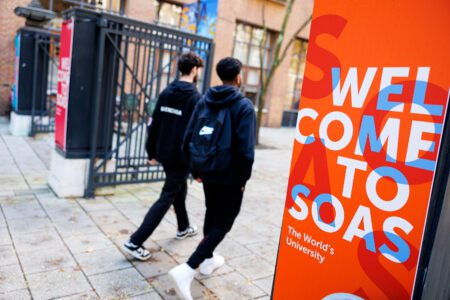One must ponder why a “progressive” world overlooks the struggles of migrants seeking a home away from conflict, danger, and disaster. In 2024, the commissioner for human rights at the Council of Europe raised concerns about asylum seekers being “forcibly expelled” at Europe’s borders — with cases of 32 Afghans and 26 Iraqis pushed back to Belarus in 2021.
It’s a sobering reality, but one that calls attention to the need for critical conversations that highlight migrant voices, challenge the politics of exclusion, and recognise those fighting for justice and belonging. Understanding what’s at stake is the first step in fighting for change, but in many universities, Eurocentric biases limit how migration and diaspora are studied.
At SOAS University of London, it’s different. Often referred to as “The World’s University,” SOAS looks at the connection between the Global North and South beyond East vs West dichotomies. Its MA Migration and Diaspora Studies uses SOAS’s decolonising perspective as the essential lens to understand the contemporary migration and border-making practices of the states in connection and consideration of the colonial legacies of the West.

SOAS University of London ranks 6th in the UK for Academic Reputation, according to QS World University Rankings 2024. Source: SOAS University of London
Dissecting from a decolonised perspective
At SOAS, learning isn’t just about memorising definitions. It’s about asking the questions others overlook. The MA Migration and Diaspora Studies, led by the #2 international faculty in the UK, goes beyond “what is migration?”
Professors push students to confront and challenge their perspective on the relationship between the Global South and Global North. They ask questions like how do we think through the Global South to critically engage and understand the rationale and impacts of the migration politics and policies of the Global North? How do we combine our research with activism? How do we use research to make interventions for established policies of migration, for the public judgement and bias of the migrant as the other?
The MA is interdisciplinary in nature, covering the intersection of migration and diaspora with race, gender, class inequality, and struggles for justice. You’ll take two compulsory courses: Migration, Borders, and Space in the first term, and African and Asian Diasporas in the second term. You’ll then customise your courses with guided options in anthropology and other fields, getting the opportunity to undertake a robust research methods course covering anthropology and other social science fields, and courses on race and gender, global sustainability and the climate crisis, and medical anthropology.
Building that global perspective through a learning process that isn’t guided by the Eurocentric worldview is integral to standing out as a graduate –– at SOAS, this can be gained through language too. Degree programmes here cover over 40 African and Asian languages to build your skills. While the standard MA Migration and Diaspora Studies spans one year of full-time study, the two-year intensive language route includes a summer abroad, where you’ll be able to sharpen your language skills in a real-world setting.

Students gain real-world experiences in international humanitarian organisations, non-governmental organisations (NGOs), and activist collectives. Source: SOAS University of London
Knowledge employers value
The MA Migration & Diaspora Studies programme has produced a first-rate employability record amongst graduates — and it’s because the skills they’ve built prepare them for the professional world. In fact, this programme was built around work experience. In the optional MODULE“From Theory to Practice & Back: Work Placements in Migration Research,” students join a London-based NGO to work with migrant and refugee communities in relevant fields across migration, diaspora, and humanitarian practice. It comes with the opportunity for you to build your network with London’s best companies and organisations.
But SOAS graduates don’t settle for routine 9-to-5 jobs. Global challenges require the problem-solving minds of global experts. As a student, you’ll be trained to reach the same heights at the SOAS Centre for Migration and Diaspora Studies — established in 2007 to facilitate projects and collaborations with other institutions locally and globally. It’s the home for research pioneers, scholars, and practitioners within the field who you’ll get to learn and connect with. From seminars and training workshops to the London Migration Festival and public lectures, you’ll be immersed in conversations that matter.
Recently, the university secured a five-year, 1.25 million pound Economic and Social Research Council (ESRC) Impact Acceleration Account (IAA) from 2023 to 2028 — making room for SOAS to advance its research across migration, displacement, minorities, and marginalisation. Meanwhile, Dr. Zerrin Özlem Biner, co-director of the Centre of the Migration and Diaspora Studies and programme convener received an award of one million pounds from the Arts and Humanities Research Council (AHRC) to form a “multi-modal digital archive of solidarity practices” with citizens and refugees in the UK and Turkey in the project: “Archives of Solidarity: Precarity, Creativity and Shared Future-making Across Closed Borders.”
This level of impact is embedded in everyday learning at SOAS. Coming here is an excellent opportunity to combine theory, practice, and a decolonial perspective that cannot be found elsewhere. Check out the MA Migration and Diaspora Studies programme here.
Follow SOAS University of London on Facebook, X, LinkedIn, Instagram and YouTube












